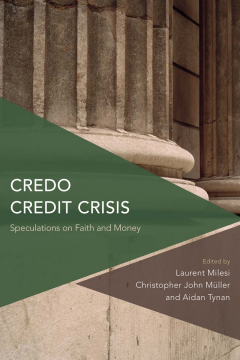
Additional Information
Book Details
Abstract
Money facilitates the rites and rituals we perform in everyday life. More than a mere medium of exchange or a measure of value, it is the primary means by which we manifest a faith unique to our secular age.
But what happens when individual belief (credo, ‘I’ believe) and the systems into which it is bound (credit, ‘it’ believes) enter into crisis? Where did the sacredness of money come from, and does it have a future? Why do we talk about debt and repayment in overtly moral terms? How should a theological critique of capitalism proceed today?
With the effects of the 2008 economic crises continuing to be felt across the world, this volume brings together some of the most important contemporary voices in philosophy, literature, theology, and critical and cultural theory together in one volume to assert the need to interrogate and broaden the terms of the theological critique of capitalism.
| Laurent Milesi is a Tenured Professor in English Literature and Critical Theory at Shanghai Jiao Tong University, and former Chair of the Centre for Critical and Cultural Theory at Cardiff University. Christopher Müller is an Honorary Research Fellow in the School of English, Communication and Philosophy at Cardiff University. |
Aidan Tynan is a Lecturer in the Cardiff School of English, Communication and Philosophy. He is the author of Deleuze’s Literary Clinic: Criticism and the Politics of Symptoms (2012). |
Richard Dienst, Associate Professor of English, Rutgers University
Nicky Marsh, Professor of English, University of Southampton
Arthur Bradley, Reader, Department of English and Creative Writing, Lancaster University
Philip Goodchild, Department of Theology and Religious Studies, Nottingham University
Simon Critchley, Hans Jonas Professor, The New School
Hollis Phelps, Assistant Professor of Religion, University of Mount Olive
Benjamin Noys, Reader in English, University of Chichester
Joshua Ramey, Assistant Professor, Grinnell College
Indradeep Ghosh, Assistant Professor of Economics, Haverford College
Josh Robinson, Lecturer, Cardiff School of English, Communication and Philosophy, Cardiff University
Peter Sedgwick, Reader, Cardiff School of English, Communication and Philosophy, Cardiff University
Bernard Stiegler, Founder of Institut de recherche et d'innovation (IRI), Centre Georges-Pompidou, Visiting Professor Goldsmiths
Credo Credit Crisis is an important intervention in the wake of the 2008 global recession. We desperately need a better understanding of the deep connections between money and faith, or religion and political economy. The editors have assembled an excellent group of contributors to tackle this urgent topic — highly recommended!
Clayton Crockett, professor and director of religious studies, University of Central Arkansas
Mining this rich semantic seam, these essays offer profound insights into the fiduciary logics that drive - and sometimes disrupt - the movements of money and markets. The authors bring the humanities’ best traditions of speculative thought into contact with speculative times past, present, and future, reimagining political economy through bold experiments in politico-economic theology.
Paul Crosthwaite, Senior Lecturer in English Literature, University of Edinburgh
Credo Credit Crisis provides a timely reminder that concepts such as debt, credit, interest, speculation and money are never just strictly economic phenomenon but abound in metaphysical subtleties and theological niceties. This brilliant volume shows how the dimension of religion is indispensable to understand as well to overcome our current economic crisis.
Ole Bjerg, Associate Professor at Copenhagen Business School
Table of Contents
| Section Title | Page | Action | Price |
|---|---|---|---|
| Credo Credit Crisis | Cover | ||
| Contents | vii | ||
| Acknowledgements | ix | ||
| Introduction: Speculative exchange: Between religion and economics | 1 | ||
| Section one: Modernity and the trajectories of sovereignty | 19 | ||
| 1 The ascendancy of finance: Toward a concept of Seignioral power | 21 | ||
| 2 Hobbes, sovereign power and money | 39 | ||
| 3 ‘Accelerator despite Itself’: Credo, crisis, Katechon | 65 | ||
| Section two: The living soul of money | 85 | ||
| 4 The Bank of England in ruins: Photography, money and the law of equivalence | 87 | ||
| 5 Seeing is believing: Looking at the gold standard | 129 | ||
| 6 Universal Shylockery: Money and morality in The Merchant of Venice | 149 | ||
| 7 ‘We are all prostitutes’: Crisis and libidinal economy | 169 | ||
| 8 The materiality of belief: On the real death of Mammon | 185 | ||
| Section three: Speculation and critique | 209 | ||
| 9 Impotent signs: Money, speculative subjectivity and the ontological proof | 211 | ||
| 10 Speculation upon speculation; or, a contribution to the critique of philosophical economy | 239 | ||
| 11 Believing in deconstruction | 271 | ||
| Section four: Future revelations | 301 | ||
| 12 Credit and investment: A matter of faith | 303 | ||
| 13 How do we know we have a future? | 333 | ||
| Index | 349 | ||
| Notes on contributors | 361 |
